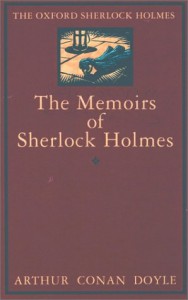Another Collection of Holmsian Mysteries

In a way I’m not entirely sure how I should approach this book, particularly since I generally don’t review short story collections as a whole but rather each story on its merits. Mind you, that is probably going to cause a little bit of a problem when I get around to reading the Collected Tales of Edgar Allen Poe, particularly since I can’t do The Raven the injustice of lumping it together with a bunch of other stories. Then there is At the Mountains of Madness, though it has been a while since I have read anything by Lovecraft, and even then it was only one story, ironically ‘At the Mountains of Madness’. However, I will get around to writing about them when I finally get around to reading the books (and I might read them a short story at a time, as I did with a collections of stories by Joseph Conrad).
However, the problem with Sherlock Holmes is that it is, in a way, the lack of variety in the stories. That doesn’t necessarily mean that the stories themselves are bad, it is just that pretty much, with the exception of the content, all of the stories end up being of a similar structure. In fact the novels also followed this structure as well, namely: Holmes is confronted with a problem (which takes up the first part of the story), Holmes wanders about and works it out, Holmes then spends the rest of the story explaining what happened. As it turned out this formula worked out really well, if the five collection of short stories, and four novels, are anything to go by.
It’s not as if these stories are unoriginal either – a lot of mystery novels that I have read basically all deal with murders, and in a way it starts to become a little dull and dry. However, while people do die in a Sherlock Holmes story, and of course you have the occasional one where the eventual victim hires Holmes due to some mystery, murder isn’t always the case. In fact, you have ones that involve missing objects, or objects that have been discovered and Holmes is attempting to locate the owner. We have another one that involves a child of a previous marriage that the mother is trying to keep a secret, or a naval treaty that has become the centerpiece of a mystery. In fact it is not the crime that is important, it is the mystery, as in some cases it turns out that no crime has actually been committed.
I guess that is one aspect of our human nature – we love mysteries. In fact not knowing is far more exciting than actually discovering the answer, because once we know the answer all of a sudden it ceases to be a mystery and the revelation turns out to be really boring. Mind you, it isn’t as if the revelation is boring, it is just that knowing the answer is boring. It is sort of like hunting, or even courting a future wife – it isn’t the success that is exciting, it is the journey to reach that point. Sure, not all journeys are thrilling – being stuck in economy class traveling from Singapore to Frankfurt (which takes something like 12 hours) isn’t at all exciting, especially if you have somebody behind you kicking your seat (something that fortunately I didn’t have to experience), or the guy in front of you lying his seat back as far is possible and leaving it there for the entire journey meaning that I can’t use my laptop (and that is after having the previous occupant kicked out of the seat because ‘he must has a window seat’, though as it usually turns out, the previous occupant is usually moved to business class as compensation for the inconvenience – something that has happened to me).
One interesting thing is that it seems to be apparent that Doyle was attempting to wind up his Holmes stories – why else would he finish the final story by having Holmes thrown off the top of a waterfall. Personally, I’m probably not surprised because while people may have enjoyed the stories, Doyle might have been having a lot of trouble coming up with new stories – writers block if you will. Otherwise, it simply might have been that he had become somewhat bored with the character and wanted to move on. The problem is that once somebody creates something that is beloved by the community, then it can be pretty hard to put it behind you. In a way it is the curse of the celebrity status – once you have become a celebrity you are no longer your own person – you are now what the media, and the fans, make you out to be, and if it turns out that you break this mould, then you run the risk of losing that status all together – while it is painful, it is also incredibly addictive. One simply cannot stop being a celebrity.
 3
3


